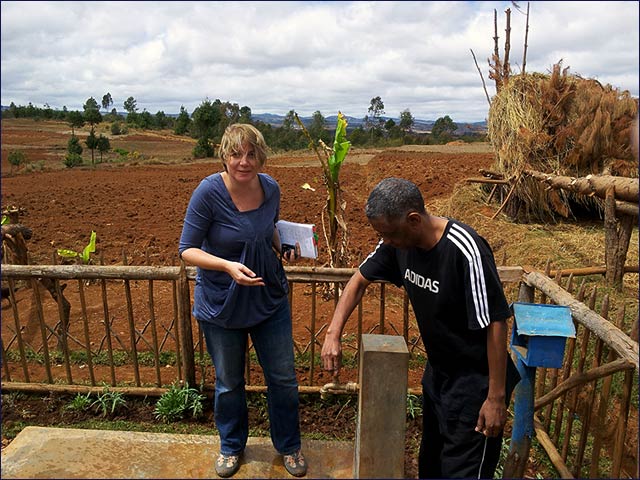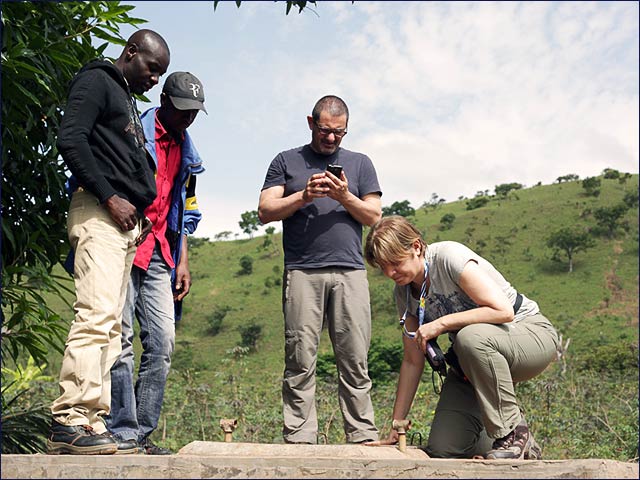Rivka Borochov
Economists predict that in the next 15 years Africa’s economy will be growing at a frenzied pace, similar to India and China. Early birds have started racing into Africa to get businesses off the ground.
But what works in Europe or America –– or even in Israel -- doesn’t necessarily work in Africa, especially when you are talking about Africa’s poorest people.
That is why the new Israeli company
Waterways has sprung to life. The basic idea is to take the enormous innovations in water coming out of Israel and adapt them to rural areas in Africa.
There is a triple bottom line to fulfill here: people, planet and profit, according to Waterways managing director and founder Ornit Avidar, a startup success story in her own right, and a former diplomat. She has made it her new life mission to help water technologies enter African villages and stick.
Through her research she’s found that about 50 percent of all water projects in Africa’s rural regions cease within a year of implementation.
Cultural reasons, lack of upkeep funding or conflict –– there are endless reasons why “abroad” solutions don’t work in Africa.
That’s too much money going down the drain, says a pragmatic Avidar, who has developed another way.
Soft solutions, for a change?
Rather than propose the sort of large water projects found in municipalities and cities in the West, Avidar has her water compass set on providing Africa’s villagers with soft solutions -- scalable, powered by little or off-grid energy, and requiring no advanced technical knowhow to maintain. Her business approach also includes economic models to help villagers make money.
A growing number of Israeli companies fit the Waterways approach, such as SunDWater, which helps people tap into brackish water sources. The off-grid solution pumps up water and purifies it using thermal solar radiation. People from all over Africa are already asking for this.
Tahal, which offers rural wastewater solutions, and soil structure-support company
Anyways Solutions are two other companies working with Waterways in the focus countries of Cameroon, Senegal and Ghana.
Waterways also is working in Cameroon with the NGO Life and Water Development Group on a feasibility study for a project called VIC, Village Income Center.

Avidar has experience in startups and diplomacyWaves of water in a drought
Although Israel is currently experiencing a drought, it is managing an over-capacity of water due to intense water management and desalination production.
Talking with African stakeholders, Avidar learned that they would like to have these Israeli technologies too.
Building connections and projects takes time in Africa, she admits. “You can’t get around it,” Avidar says of the lengthy time process.
However, billions of dollars’ worth of business deals are already flowing between Israel and the continent, and Avidar is laying the groundwork now for a new kind of business for tomorrow. She has thus far signed 12 letters of intent with African governments to implement Israel’s soft water-tech solutions.
And Waterways has signed an agreement with the Water and Sanitation Organization of Africa, which links 36 African countries under its umbrella.
For now, Avidar is concentrating on business development with Israeli companies, most of which she can’t mention due to confidentiality agreements. She is not averse to working with solutions from other nations as well.
“My passion is Israel and Israeli companies, since I was a trade representative in the past. I love working with Israeli companies,” she says.

Avidar discovered that half of all water projects in rural Africa die within a yearWhat sets Waterways apart from other consultancies and companies? “Our holistic methodologies,” says Avidar. “Our work is in the soft solutions. There are many technologies that can work. But the question is how do you integrate them? So many projects have gone down the drain” using the wrong methods, she says.
Africans, she adds, “want something extra.”
Waterways has accordingly developed a process in Africa over the last three years that ensures project managers will keep working “the day after,” says Avidar. This is when the builders and contractors go home and the rural people need to start managing the project on their own.
“We integrate technological solutions with social ones,” she says.
Waterways, founded in 2010, is based in Shoresh, Israel, and employs four people full time.